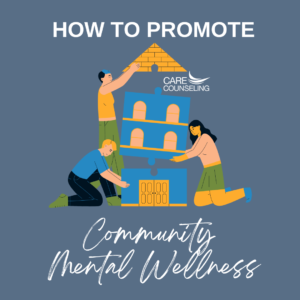How to Promote Mental Wellness in Your Community
 Mental health is an essential aspect of overall well-being, and as communities, we have a responsibility to promote and support mental wellness among our members. Unfortunately, mental health issues continue to be stigmatized and misunderstood, leading to inadequate attention and resources being dedicated to this critical aspect of human health. However, by fostering a supportive and compassionate environment, we can create a positive impact on mental wellness in our communities.
Mental health is an essential aspect of overall well-being, and as communities, we have a responsibility to promote and support mental wellness among our members. Unfortunately, mental health issues continue to be stigmatized and misunderstood, leading to inadequate attention and resources being dedicated to this critical aspect of human health. However, by fostering a supportive and compassionate environment, we can create a positive impact on mental wellness in our communities.
- Education and Awareness
The first step in promoting mental wellness is education and awareness. Many individuals in our communities may not fully understand mental health, mental illnesses, or the available resources for support. Organize workshops, seminars, and informational sessions to educate community members about mental health, common mental disorders, and the importance of seeking help. Spread awareness through social media, local newspapers, and community bulletin boards to reach a broader audience.
- Open Dialogues and Support Groups
Create safe spaces for open dialogues about mental health. Encourage community members to share their experiences, challenges, and triumphs related to mental wellness. Support groups can be instrumental in providing a supportive environment for those struggling with mental health issues. These groups offer a sense of belonging and reduce feelings of isolation, fostering empathy and understanding within the community.
- Collaborate with Mental Health Professionals
Work in collaboration with mental health professionals and organizations to provide resources and services to community members. Host mental health screenings, counseling sessions, and workshops facilitated by qualified therapists and counselors. These collaborations can help bridge the gap between mental health services and the community, making them more accessible to those in need.
- Incorporate Mental Wellness into Community Events
Integrate mental wellness into community events and activities. For instance, during health fairs or community festivals, set up booths or stations that offer information about mental health, self-care practices, and stress management techniques. Organize fun and engaging activities that promote relaxation and mindfulness, such as meditation workshops, yoga classes, or art therapy sessions.
- Encourage Physical Activity
Physical activity has a profound impact on mental wellness. Organize community walks, runs, or sports events to encourage regular exercise and physical activity. Engaging in physical activities not only improves physical health but also releases endorphins that boost mood and reduce stress.
- Promote Work-Life Balance
Incorporate work-life balance initiatives within the community. Encourage employers to provide flexible working hours, promote a positive work environment, and offer mental health support to their employees. A healthy work-life balance is crucial for reducing stress and preventing burnout.
- Combat Stigma
One of the most significant barriers to mental wellness is the stigma associated with mental health issues. Launch anti-stigma campaigns to challenge stereotypes and misconceptions about mental illnesses. Encourage community members to share their stories of recovery and resilience, promoting the understanding that mental health is just as important as physical health.
- Create Safe Spaces for Vulnerable Groups
Some community members may face unique challenges in maintaining their mental wellness. Create safe spaces and support systems for vulnerable groups, such as LGBTQ+ individuals, veterans, survivors of trauma, or immigrants. Ensuring that everyone feels included and supported is vital in promoting overall community mental wellness.
- Teach Coping Strategies and Resilience
Provide workshops and training sessions on coping strategies and building resilience. Teaching individuals how to manage stress, anxiety, and emotional challenges empowers them to take charge of their mental well-being. Offer tools and resources that can be easily accessed in times of need.
Promoting mental wellness in our community is a collective effort that requires compassion, understanding, and collaboration. By raising awareness, providing education, and offering support, we can create a more inclusive and mentally healthy environment for all community members. Remember that small gestures of kindness, empathy, and active listening can make a significant difference in someone’s mental well-being. Together, let’s break the stigma surrounding mental health and work towards a happier, healthier, and more resilient community.



























